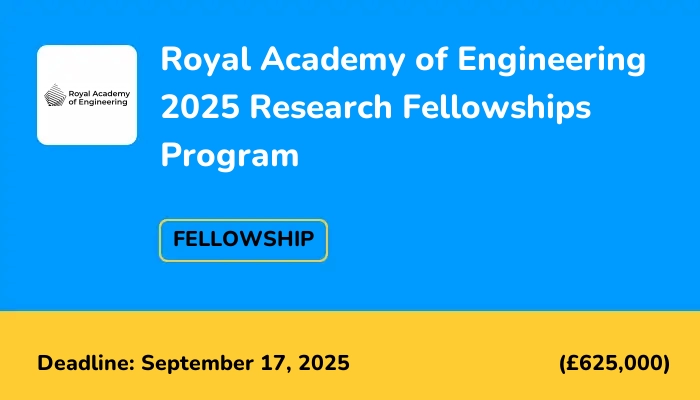The Royal Academy of Engineering offers Research Fellowships each year to outstanding early-career researchers to support them to become future research leaders in engineering. The scheme's objectives are to:
- Support the best early-career researchers in establishing their independence and international reputation
- Provide long-term support enabling the pursuit of an ambitious programme of engineering research and impact
- Develop ambassadors for the Academy and advocates for STEM (science, technology, engineering and mathematics) disciplines
About Royal Academy of Engineering

Subscribe for scholarship update!
Be among the first to know whenever new Royal Academy of scholarship is going on. Enter your email address and click the Subscribe button ↓
Research Fellowships Program
Aim and Benefits of Research Fellowships Program
Each application is capped at a maximum contribution from the Academy of £625,000 over the five-year period, at 80% of full economic costs. R
In addition to the direct financial support, the scheme benefits include:
- Mentoring support from an Academy Fellow to offer advice on research and career development.
- Reduction of teaching and administrative duties to dedicate time to research.
- Training and additional funding opportunities.
- Networking opportunities with other Research Fellows and Academy Fellows.
- An opportunity to establish a strong research track record which will improve the chances of securing additional funding and expanding their own research teams.
- Be part of the RAEng Awardee Excellence Community.
Research Fellowships Program Courses
Requirements for Research Fellowships Program Qualification
- Research Fellowships must be held at one of the following eligible institutions that can show it is capable of fully supporting an engineering-focused research project and researcher:
- a UK higher education institution/university or
- a UK research organisation that is eligible to receive UKRI funding. A list of eligible research organisations is included in the Applicant Guidance notes.
- The host institution must agree to provide the Research Fellow all the support normal for a permanent employee.
- The proposed research project must be in an engineering subject area. Engineering is defined in its broadest sense, encompassing a wide range of diverse fields.
- Research Fellowships are aimed at early-career researchers. Applicants must have a PhD, which was awarded (or the PhD has been unconditionally approved) no more than four years before the submission deadline: Wednesday 17 September 2025. This period includes applicants’ work experience in academia or/and in industry in the UK or/and worldwide. A margin of up to three months more than the four-year limit is acceptable. If applicants have had maternity/paternity leave or other extenuating circumstances (e.g. extended sick leave, national service, caring responsibilities and relocation due to fear of persecution or human rights violation), this will be taken into consideration if the relevant dates and details are provided in the application form.
- Previously Research Fellowships could be held part time but must have been the only form of employment, however from round 25 this requirement has been removed. The part-time requirement is limited to a minimum of 50% of the fellowship time. The other source of employment should be external to the host organisation, such as industry, government, or other stakeholders. The request for a part-time Research Fellowship (at no less than 50% of full-time equivalent) must be clearly stated within the application. Alternatively, the Research Fellowship can be converted from full time to part time, or from part time to full time, during the fellowship, assuming the host institution supports the request.?
- There are no nationality and age restrictions for applicants. The host institution is responsible for securing all necessary work permits and related costs for the Research Fellows.
- Applicants who have applied to this scheme before and were unsuccessful are eligible to reapply. These applications will be considered as new applications.
- Research Fellowships must begin between 1 August 2026 and 31 October 2026. The duration of a Research Fellowship is five years full time, calculated on a pro-rata basis for part-time awards. Requests for a shorter Research Fellowship are not accepted.
- There is a limit on the number of applications each host institution can submit.
Interview date, Process and Venue for Research Fellowships Program
Selection process
The scheme has a three-stage selection process.
Stage one: general review
Each eligible application will be assessed by three non-expert reviewers (Academy Fellows or former Research Fellows). The selection of applications proceeding to next stage assessment is made by a sift panel (consisting of Academy Fellows).
Stage two: expert review
Each selected application will be assessed by three expert reviewers, who have expertise in the proposed research. This will be followed by a shortlist panel to select the most competitive applications to proceed to stage three: interviews.
Stage three: interviews
Interviews will take place online. Each interview will be conducted by a panel of four Academy Fellows and will be 30 minutes long. This includes a five-minute presentation from the candidate. Following the interviews, the panel will rank the applications and select the top ranked candidates for awards.
The assessment criteria include the following subjects:
- Candidate
- Research quality and vision
- Research environment
- Resource and management
- Beneficiaries and impact
Application Deadline
September 17, 2025How to Apply
Interested and qualified? Go to
Royal Academy of Engineering on raeng.org.uk to apply
For more details, visit Royal Academy of Engineering Fellowship webpage
 Menu
Menu

